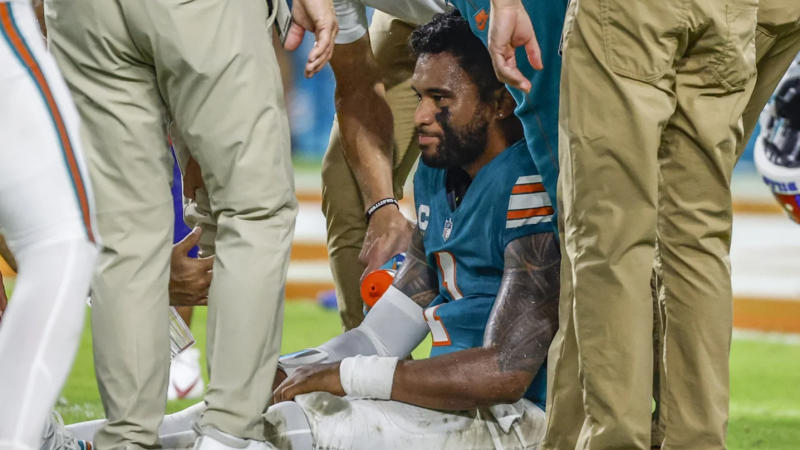Published 13:42 IST, September 15th 2024
Reaction to Tua Tagovailoa's latest concussion shows the NFL has come a long way
The NFL has come a long way since the times when players brushed off concussions and stayed in the game or returned too soon.

The NFL has come a long way since the times when players brushed off concussions and stayed in the game or returned too soon.
No more using smelling salts on the bench and getting back in the huddle. No more rubbing dirt on injuries. No more trying to “suck it up” and playing through a potentially serious problem.
The reaction to Tua Tagovailoa’s latest concussion shows how the league, its current and former players, fans and the media have evolved.
Tagovailoa sustained his fourth diagnosed concussion in five years in Miami’s 31-10 loss to Buffalo on Thursday. It was another frightening moment for a quarterback who has a history of head injuries.
Immediately, the concern centered on Tagovailoa’s long-term health. Nobody was wondering when he will play again. Rather, most folks watching were debating whether Tagovailoa should ever lace up his cleats and step on the field again.
“If I’m him, at this point, I’m seriously considering retiring from football,” Hall of Fame tight end Tony Gonzalez said on Amazon Prime Video’s broadcast after the game. “If that was my son, I would be like, ‘It might be time.’ This stuff is not what you want to play around with.”
Former Bengals and Rams tackle Andrew Whitworth pointed to the difference between concussions and other injuries.
“There’s so many injuries we can have surgeries for, there’s so many things we can fix,” Whitworth said. “But a head trauma and getting knocked out on the field? There’s really not much you can ever do about that. You can’t go to a doctor and say, ‘Hey, fix my brain and the damage I’ve done to it.’”
More education about brain injuries has led to strict guidelines that help protect players, sometimes from themselves.
The league and the NFL Players Associations instituted concussion protocols in 2011 when Colt McCoy took a helmet-to-helmet hit in a game and returned without being tested for a concussion.
The protocols have been expanded a few times since. There are independent certified athletic trainers, or ATC spotters, watching in a booth and monitoring the players on the field to have someone removed from the game if they see an impact to the head. Team trainers, coaches or physicians, teammates, game officials or sideline unaffiliated neurotrauma consultants also can initiate the protocol.
All players who undergo any concussion evaluation on game day must have a follow-up evaluation conducted the next day by a member of the medical staff. Players have to pass various testing to get cleared to play again.
It’s a different era for player safety in the NFL.
In 2013, the league agreed to pay more than three-quarters of a billion dollars to settle lawsuits from thousands of former players who developed dementia or other concussion-related health problems they say were caused by on-field violence.
More than 4,500 former players, some of them suffering from Alzheimer’s disease or depression, accused the NFL of concealing the long-term dangers of concussions and rushing injured players back onto the field.
Now, caution is stressed at every level.
It’s too early to determine if or when Tagovailoa will play again. But everyone agrees his health is the main priority.
“The reality is we have more information (now) about the long-term potential effects of having concussions during football,” former Cowboys defensive end Marcus Spears said on ESPN’s “NFL Live” panel, which also features former quarterback Dan Orlovsky and defensive back Ryan Clark. “I’m not going to lie. We played kinda blindly. We thought a concussion was in five, six days when you passed protocol, you stopped having headaches and you’re not light-sensitive, you’re back on the field.
“I wasn’t thinking about the potential when I turn 45 to 50 years old. I can imagine these conversations now are being turned into making sure long term that Tua is making a decision based on now but more importantly for his family and his two children. ... With the ability to have more information about the impact long term, it makes this discussion have more detail and more nuance than just saying: ‘Bounce back, Tua. We’ll see you when get back on the field.’”
Tagovailoa, who signed a four-year, $212.4 million contract extension in the offseason, won’t be pressured to play. Dolphins coach Mike McDaniel made it clear the team won’t put any pressure on Tagovailoa.
“I know the facts are that it’s important that he gets healthy day by day and in that, the actual, the best thing I can do is not try to assess what this even means from a football standpoint,” McDaniel said. “I have to put his health as the primary.”
Updated 13:42 IST, September 15th 2024




